The Power of Child Rights: Nurturing an Inclusive World
We live in a world where hopes and dreams of the future lie within the hearts, minds and bodies of children. Thus, it is our collective responsibility to ensure that their rights are upheld.
Child rights are fundamental liberties that every child deserves, regardless of their gender or socioeconomic background. We must come together to safeguard them and foster an inclusive society with equal access to physical, intellectual and emotional development.
Acknowledging the need of the hour, the United Nations Educational, Scientific and Cultural Organization (UNESCO) and governments worldwide specified the fundamental child rights we all must strive to protect. By defining and guarding these rights, we recognise and nurture the inherent value and potential of every child.
Child Rights by UNESCO
• Name, citizenship and identity: Every child must be registered soon after their birth. They must be given a name that is accepted by the government of the nation. Additionally, they must be given legal access to their own identities, complete with records of their names, families and nationalities.
• Best interests of the child: A child's guardians should prioritise the child's needs when making decisions. The guardians must also be closely monitored by the government.
• No discrimination: No child should be discriminated against based on their socioeconomic status.
• Survival and development: Every child, including those with special needs, has the right to the best possible life and development.
• Parental contact: Every child must live under the supervision and care of both parents unless doing so endangers the child. Governments must permit parents and children to travel to stay in contact if they reside in separate nations.
• Rights to security and protection from kidnapping, labour, harmful drugs and abuse.
• Respect for children’s views: Every child capable of forming their views has the right to express them freely in all matters affecting the child. These views will be given due weight according to the age and maturity of the child.
• Right to health, water, food, environment, information, education, rest, play, culture, arts, privacy and secure home.
• Family guidance: Families and communities must help children exercise their rights effectively.
Children who violate the law have a right to legal representation. They must be given access to counselling and a fair chance to contribute positively to their communities. Juvenile detention centres should always be the last resort.

Child Rights in India
Child rights mandated by law in India are similar to those declared by UNESCO.
Right to Survival
Right to be born and have access to healthy food, shelter, clothing, medical treatment, safe drinking water and a hygienic and secure environment.
Right to Development
Right to education, play and leisure; right to physical, mental and emotional growth.
Right to Protection
Right to be protected against abuse, neglect, violence and dangerous drugs.
Right to Participation
Right to information and to take part in any decision-making that directly or indirectly affects the child. They also have the freedom of expression, association and opinion.
There has been noteworthy progress in how a child is treated in India. To ensure the nation's children grow up healthy, government schemes like the PM POSHAN Abhiyaan, Operation Smile, Protection of Children from Sexual Offences (POCSO) Act of 2012, the Integrated Child Protection Scheme, the National Commission for Protection of Child Rights (NCPCR) and many others are constantly at work.
The past few decades have seen numerous NGOs in India mobilising resources to promote child rights and combat child exploitation. They have successfully safeguarded millions of children with the help of their government and law-abiding citizenry.

Let’s unite to protect child rights
Emotional, intellectual and creative growth are crucial facets of a child’s development, for which ensuring their rights becomes paramount. Providing school meals is one of the most effective ways to guarantee these rights and the healthy development of children. It builds a robust foundation to support their emotional well-being, intellectual growth and creative expression throughout their lives.
Let us unite in our commitment to protect child rights by nourishing the minds, bodies and spirits of our youngest generation. By taking out time from our busy schedules to contribute the little we can, we shall collectively forge a bright and inclusive future for all.